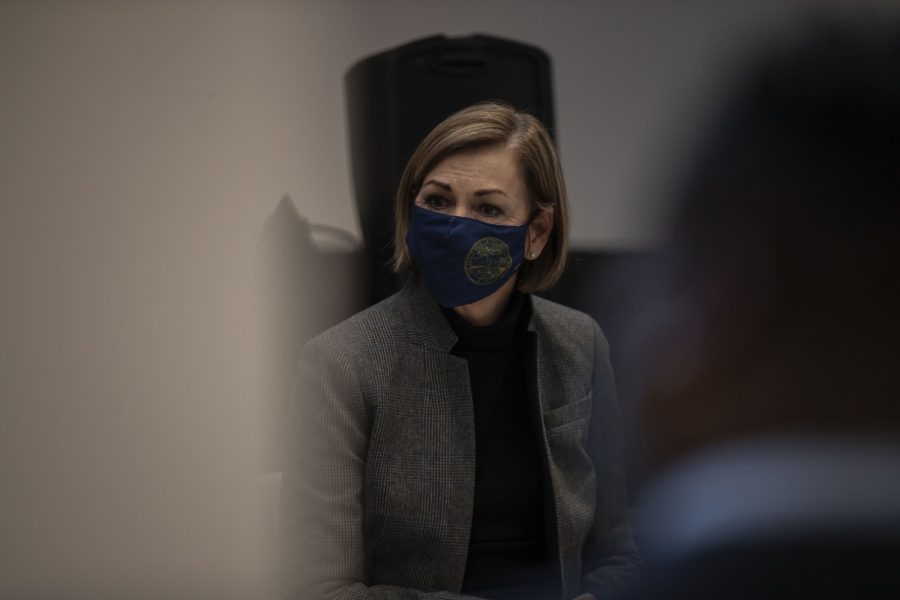Opinion | Public-private partnerships can help Iowa win the war against COVID-19
Iowa needs to use public-private partnerships. They have proven instrumental in developing and distributing vaccines across the country.
Gov. Kim Reynolds listens during a conference at the GuideLink Center in Iowa City on Thursday, Feb. 11, 2021. The new crisis center is a collaborative project between the Johnson County Board of Supervisors and community partners, and focuses on providing mental health and substance use care. It will have a soft opening on Monday.
February 21, 2021
Gov Kim Reynolds’ vaccine rollout has been lackadaisical.
The original partnership with Microsoft to help develop a vaccine distribution system was a necessary first step. However, she decided to undo the little progress she had made in getting the vaccine out by canceling the contract.
Currently, Iowa is near the middle of the 50 states in its vaccine distribution rate. Our vaccine rollout is lagging because Iowa does not have the required amount of resources to effectively distribute the vaccines. Johnson County health officials have warned against creating a centralized system, at least for the county, because health care partners already have patient information in their databases.
Reynolds should have stuck with the public-private partnership — also known as a P3 — with Microsoft.
Whenever there has been a crisis, the U.S. has turned to private firms for help.
There was no exception in the war against coronavirus as government funding helped biotechnology firms develop highly effective vaccines in record time.
This is best seen by Operation Warp Speed, the government program which invested heavily into vaccine development.
This resulted in the development of life-saving vaccines such as the Moderna vaccine.
Through Operation Warp Speed, Moderna received an eye-watering $2.48 billion in government funding to develop a vaccine with nearly 95 percent efficacy in less than a year, something that was unheard of until recently.
The success of P3s in the fight against the coronavirus is not just limited to the domain of vaccine development. They have also played an integral part in helping the U.S. have one of the top vaccine distribution systems in the world.
Washington State partnered with companies such as Costco, Starbucks, and Microsoft to set up robust distribution systems that have helped get people the vaccines that they need.
North Carolina has also partnered with local sports franchises in order to administer more than 36,000 shots.
On the federal level, President Biden has envoked the Defense Production Act which allows the federal government to direct private companies to manufacture more supply of the COVID-19 vaccines.
Because of the action taken by state and federal governments, the U.S. has distributed the most vaccines in the world standing at 42.4 million.
However, there is still a long way to go as it is important to note some states, such as Iowa, have taken a haphazard approach when it comes to distributing the vaccine.
Reynolds needs to get serious with setting up an effective distribution system and is going to need to strike a deal with private firms that will take some pressure off the state when it comes to getting the vaccine out to people who need them quickly.
Cooperation between private businesses and the state government is what is going to pull Iowa out of the COVID-19 crisis.
To maximize efficiency, Iowa needs to commit to an aggressive plan that uses all of the available resources of the public and private sectors. Too many people have unnecessarily died from COVID-19, and our best shot at stopping the plague is smart policy that revolves around P3s.
Columns reflect the opinions of the authors and are not necessarily those of the Editorial Board, The Daily Iowan, or other organizations in which the author may be involved.

















